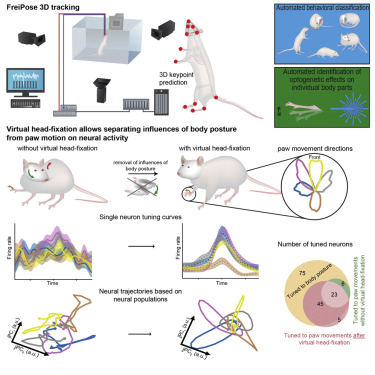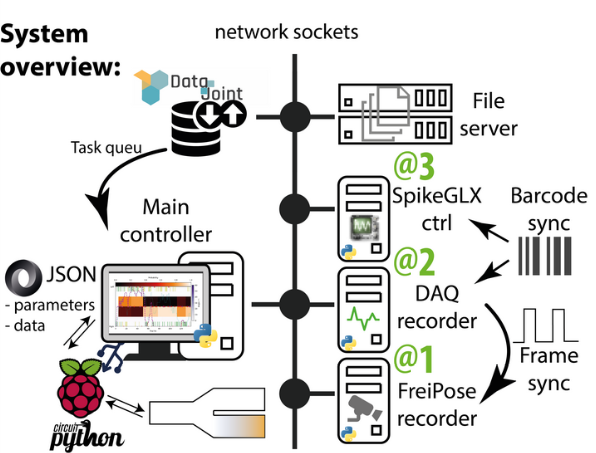Artur Schneider
Postdoc @ The Mathis Lab of Adaptive Intelligence, Previously @ Optophysiology Lab, Freiburg ![]() .
.

The Mathis Lab of Adaptive Intelligence, EPFL
Geneva, Switzerland
![]() Welcome!, Site is currently under construction.
Welcome!, Site is currently under construction.
selected publications
-
 3D pose estimation enables virtual head fixation in freely moving ratsArtur Schneider, Christian Zimmermann, Mansour Alyahyay, and 3 more authorsNeuron, Jul 2022
3D pose estimation enables virtual head fixation in freely moving ratsArtur Schneider, Christian Zimmermann, Mansour Alyahyay, and 3 more authorsNeuron, Jul 2022The impact of spontaneous movements on neuronal activity has created the need to quantify behavior. We present a versatile framework to directly capture the 3D motion of freely definable body points in a marker-free manner with high precision and reliability. Combining the tracking with neural recordings revealed multiplexing of information in the motor cortex neurons of freely moving rats. By integrating multiple behavioral variables into a model of the neural response, we derived a virtual head fixation for which the influence of specific body movements was removed. This strategy enabled us to analyze the behavior of interest (e.g., front paw movements). Thus, we unveiled an unexpectedly large fraction of neurons in the motor cortex with tuning to the paw movements, which was previously masked by body posture tuning. Once established, our framework can be efficiently applied to large datasets while minimizing the experimental workload caused by animal training and manual labeling.
@article{Schneider2022, title = {3D pose estimation enables virtual head fixation in freely moving rats}, volume = {110}, issn = {0896-6273}, url = {http://dx.doi.org/10.1016/j.neuron.2022.04.019}, doi = {10.1016/j.neuron.2022.04.019}, number = {13}, journal = {Neuron}, publisher = {Elsevier BV}, author = {Schneider, Artur and Zimmermann, Christian and Alyahyay, Mansour and Steenbergen, Florian and Brox, Thomas and Diester, Ilka}, year = {2022}, month = jul, pages = {2080--2093.e10}, keywords = {Animal, J}, dimensions = {true}, } - Poster
 FreiControl: A cost-efficient, open-source system for investigating individual strategies in decision making of rodentsArtur Schneider, Julian Graef, and Ilka DiesterJul 2024FENS meeting
FreiControl: A cost-efficient, open-source system for investigating individual strategies in decision making of rodentsArtur Schneider, Julian Graef, and Ilka DiesterJul 2024FENS meetingWell designed behavioral experiments are vital to understand the complexities of neural coding, particularly as it becomes evident that such coding may be context-specific, highly distributed, and multiplexed. Traditional commercial solutions for behavioral setups, although available, often lack flexibility and comprehensive user control, and their high costs limit accessibility. Recognizing the necessity for rapid development and adaptability in behavioral experiments, we introduce here a novel cost-efficient, open-source system for controlling behavioral experiments that maintains the crucial aspects of reproducibility, monitoring, and control. At its core stands the Raspberry Pi Pico microcontroller (5 euro), which utilizes CircuitPython. This choice offers an accessible, easy-to-learn Python-based syntax, and supports a range of affordable hardware elements. Our system integrates effortlessly with synchronized video recording, digital and analog signal acquisition, all streamlined through user-friendly GUIs.To complement behavioral experiments with causal interrogation we designed a budget-friendly (<50 euros), modular and versatile laser-controller element for optogenetics, enabling precise control over various stimulation parameters of up to four lasers through an intuitive interface.We showcase the efficacy of our system with an implementation of a behavioral task for freely moving rats, whereby the animals have to dynamically adopt their strategy depending on the environmental state or external stimuli. Using modular and progressive training procedures, we demonstrate that rats can be proficiently trained in less than three weeks. This innovative system offers a flexible, modular approach for designing behavioral experiments, significantly reducing costs and enhancing scalability, thereby supporting a wide access to advanced experimental setups in neuroscientific research.
@misc{FENSposter2024, doi = {10.57736/FB64-017C}, url = {https://www.world-wide.org/fens-24/freicontrol-cost-efficient-open-source-741ccb4d}, author = {Schneider, Artur and Graef, Julian and Diester, Ilka}, title = {FreiControl: A cost-efficient, open-source system for investigating individual strategies in decision making of rodents}, publisher = {Science Communications World Wide}, year = {2024}, copyright = {Attribution 4.0 International (CC BY 4.0)}, note = {FENS meeting}, keywords = {Animal, P}, } - Preprint
 Freilaser: Flexible Pulse Generator for Laser Control in Optogenetic ExperimentsArtur Schneider and Ilka DiesterJul 2025
Freilaser: Flexible Pulse Generator for Laser Control in Optogenetic ExperimentsArtur Schneider and Ilka DiesterJul 2025To facilitate optogenetic experiments in neuroscience, we designed a cost-effective (<40 €) and versatile laser control system, FreiLaser, based on the Raspberry Pi Pico microcontroller running CircuitPython. FreiLaser allows precise control over various stimulation parameters for up to four lasers, utilizing both analog and digital signals. It features a user-friendly graphical interface for parameter configuration and real-time visualization, as well as an API for seamless integration with existing experimental setups. The system also includes a built-in mask controller to prevent behavioral bias by synchronizing masking LEDs with laser pulses. Validation tests confirmed that FreiLaser generates stable, temporally precise control signals, suitable for a range of stimulation patterns. The system’s flexibility, ease of use, and low cost make it an invaluable tool for researchers conducting optogenetic and behavioral studies. Our open-source design ensures accessibility and adaptability for a wide range of experimental needs.
@misc{schneider_freilaser_2024, title = {Freilaser: Flexible Pulse Generator for Laser Control in Optogenetic Experiments}, url = {https://www.ssrn.com/abstract=5022052}, doi = {10.2139/ssrn.5022052}, shorttitle = {Freilaser}, publisher = {{SSRN}}, author = {Schneider, Artur and Diester, Ilka}, year = {2025}, keywords = {R}, }